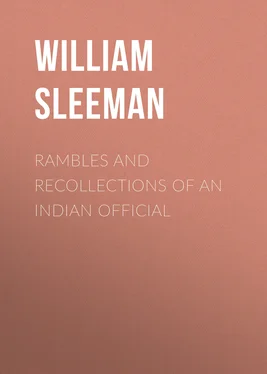William Sleeman - Rambles and Recollections of an Indian Official
Здесь есть возможность читать онлайн «William Sleeman - Rambles and Recollections of an Indian Official» — ознакомительный отрывок электронной книги совершенно бесплатно, а после прочтения отрывка купить полную версию. В некоторых случаях можно слушать аудио, скачать через торрент в формате fb2 и присутствует краткое содержание. Жанр: Путешествия и география, История, foreign_edu, foreign_antique, foreign_prose, на английском языке. Описание произведения, (предисловие) а так же отзывы посетителей доступны на портале библиотеки ЛибКат.
- Название:Rambles and Recollections of an Indian Official
- Автор:
- Жанр:
- Год:неизвестен
- ISBN:нет данных
- Рейтинг книги:4 / 5. Голосов: 1
-
Избранное:Добавить в избранное
- Отзывы:
-
Ваша оценка:
- 80
- 1
- 2
- 3
- 4
- 5
Rambles and Recollections of an Indian Official: краткое содержание, описание и аннотация
Предлагаем к чтению аннотацию, описание, краткое содержание или предисловие (зависит от того, что написал сам автор книги «Rambles and Recollections of an Indian Official»). Если вы не нашли необходимую информацию о книге — напишите в комментариях, мы постараемся отыскать её.
Rambles and Recollections of an Indian Official — читать онлайн ознакомительный отрывок
Ниже представлен текст книги, разбитый по страницам. Система сохранения места последней прочитанной страницы, позволяет с удобством читать онлайн бесплатно книгу «Rambles and Recollections of an Indian Official», без необходимости каждый раз заново искать на чём Вы остановились. Поставьте закладку, и сможете в любой момент перейти на страницу, на которой закончили чтение.
Интервал:
Закладка:
On the 29th November, 1829, this old woman, then about sixty-five years of age, here mixed her ashes with those of her husband, who had been burned alone four days before. On receiving civil charge of the district (Jubbulpore) in March, 1828, I issued a proclamation prohibiting any one from aiding or assisting in suttee, and distinctly stating that to bring one ounce of wood for the purpose would be considered as so doing. If the woman burned herself with the body of her husband, any one who brought wood for the purpose of burning him would become liable to punishment; consequently, the body of the husband must be first consumed, and the widow must bring a fresh supply for herself. On Tuesday, 24th November, 1829, I had an application from the heads of the most respectable and most extensive family of Brahmans in the district to suffer this old woman to burn herself with the remains of her husband, Ummēd Singh Upadhya, who had that morning died upon the banks of the Nerbudda. 53 53 Whenever it is practicable, Hindoos are placed on the banks of sacred rivers to die, especially in Bengal.
I threatened to enforce my order, and punish severely any man who assisted; and placed a police guard for the purpose of seeing that no one did so. She remained sitting by the edge of the water without eating or drinking. The next day the body of her husband was burned to ashes in a small pit of about eight feet square, and three or four feet deep, before several thousand spectators who had assembled to see the suttee. All strangers dispersed before evening, as there seemed to be no prospect of my yielding to the urgent solicitations of her family, who dared not touch food till she had burned herself, or declared herself willing to return to them. Her sons, grandsons, and some other relations remained with her, while the rest surrounded my house, the one urging me to allow her to burn, and the other urging her to desist. She remained sitting on a bare rock in the bed of the Nerbudda, refusing every kind of sustenance, and exposed to the intense heat of the sun by day, and the severe cold of the night, with only a thin sheet thrown over her shoulders. On Thursday, to cut off all hope of her being moved from her purpose, she put on the dhajā, or coarse red turban, and broke her bracelets in pieces, by which she became dead in law, and for ever excluded from caste. Should she choose to live after this, she could never return to her family. Her children and grandchildren were still with her, but all their entreaties were unavailing; and I became satisfied that she would starve herself to death, if not allowed to burn, by which the family would be disgraced, her miseries prolonged, and I myself rendered liable to be charged with a wanton abuse of authority, for no prohibition of the kind I had issued had as yet received the formal sanction of the Government.
On Saturday, the 28th, in the morning, I rode out ten miles to the spot, and found the poor old widow sitting with the dhajā round her head, a brass plate before her with undressed rice and flowers, and a coco-nut in each hand. She talked very collectedly, telling me that 'she had determined to mix her ashes with those of her departed husband, and should patiently wait my permission to do so, assured that God would enable her to sustain life till that was given, though she dared not eat or drink'. Looking at the sun, then rising before her over a long and beautiful reach of the Nerbudda river, she said calmly, 'My soul has been for five days with my husband's near that sun, nothing but my earthly frame is left; and this, I know, you will in time suffer to be mixed with the ashes of his in yonder pit, because it is not in your nature or usage wantonly to prolong the miseries of a poor old woman'.
'Indeed, it is not,—my object and duty is to save and preserve them [ sic ]; and I am come to dissuade you from this idle purpose, to urge you to live, and to keep your family from the disgrace of being thought your murderers.'
'I am not afraid of their ever being so thought: they have all, like good children, done everything in their power to induce me to live among them; and, if I had done so, I know they would have loved and honoured me; but my duties to them have now ended. I commit them all to your care, and I go to attend my husband, Ummēd Singh Upadhya , with whose ashes on the funeral pile mine have been already three times mixed.' 54 54 For explanation of this phrase, see the following story of the Lodhī woman, following note [14], in this chapter. The name is abnormal. Upadhya is a Brahman title meaning 'spiritual preceptor'. Brahmans serving in the army sometimes take the title Singh, which is more properly assumed by Rājpūts or Sikhs.
This was the first time in her long life that she had ever pronounced the name of her husband, for in India no woman, high or low, ever pronounces the name of her husband,—she would consider it disrespectful towards him to do so; and it is often amusing to see their embarrassment when asked the question by any European gentleman. They look right and left for some one to relieve them from the dilemma of appearing disrespectful either to the querist or to their absent husbands—they perceive that he is unacquainted with their duties on this point, and are afraid he will attribute their silence to disrespect. They know that few European gentlemen are acquainted with them; and when women go into our courts of justice, or other places where they are liable to be asked the names of their husbands, they commonly take one of their children or some other relation with them to pronounce the words in their stead. When the old lady named her husband, as she did with strong emphasis, and in a very deliberate manner, every one present was satisfied that she had resolved to die. 'I have', she continued, 'tasted largely of the bounty of Government, having been maintained by it with all my large family in ease and comfort upon our rent-free lands; and I feel assured that my children will not be suffered to want; but with them I have nothing more to do, our intercourse and communion here end. My soul ( prān ) is with Ummēd Singh Upadhya : and my ashes must here mix with his.'
Again looking to the sun—'I see them together', said she, with a tone and countenance that affected me a good deal, 'under the bridal canopy!'—alluding to the ceremonies of marriage; and I am satisfied that she at that moment really believed that she saw her own spirit and that of her husband under the bridal canopy in paradise.
I tried to work upon her pride and her fears. I told her that it was probable that the rent-free lands by which her family had been so long supported might be resumed by the Government, as a mark of its displeasure against the children for not dissuading her from the sacrifice; that the temples over her ancestors upon the bank might be levelled with the ground, in order to prevent their operating to induce others to make similar sacrifices; and lastly, that not one single brick or stone should ever mark the place where she died if she persisted in her resolution. But, if she consented to live, a splendid habitation should be built for her among these temples, a handsome provision assigned for her support out of these rent-free lands, her children should come daily to visit her, and I should frequently do the same. She smiled, but held out her arm and said, 'My pulse has long ceased to beat, my spirit has departed, and I have nothing left but a little earth , that I wish to mix with the ashes of my husband. I shall suffer nothing in burning; and, if you wish proof, order some fire, and you shall see this arm consumed without giving me any pain'. I did not attempt to feel her pulse, but some of my people did, and declared that it had ceased to be perceptible. At this time every native present believed that she was incapable of suffering pain; and her end confirmed them in their opinion.
Читать дальшеИнтервал:
Закладка:
Похожие книги на «Rambles and Recollections of an Indian Official»
Представляем Вашему вниманию похожие книги на «Rambles and Recollections of an Indian Official» списком для выбора. Мы отобрали схожую по названию и смыслу литературу в надежде предоставить читателям больше вариантов отыскать новые, интересные, ещё непрочитанные произведения.
Обсуждение, отзывы о книге «Rambles and Recollections of an Indian Official» и просто собственные мнения читателей. Оставьте ваши комментарии, напишите, что Вы думаете о произведении, его смысле или главных героях. Укажите что конкретно понравилось, а что нет, и почему Вы так считаете.












